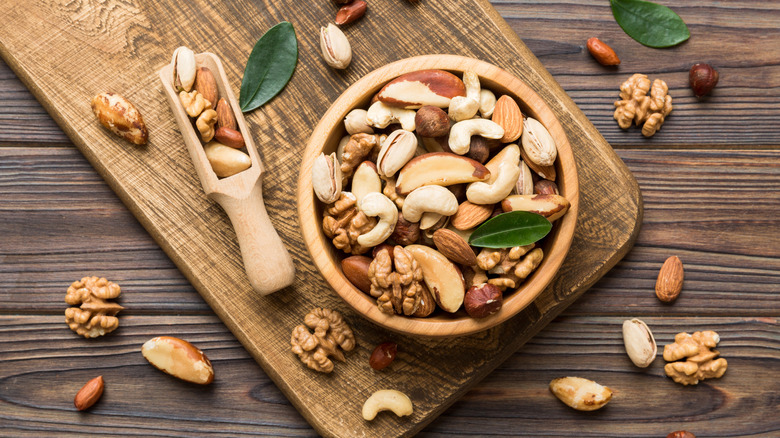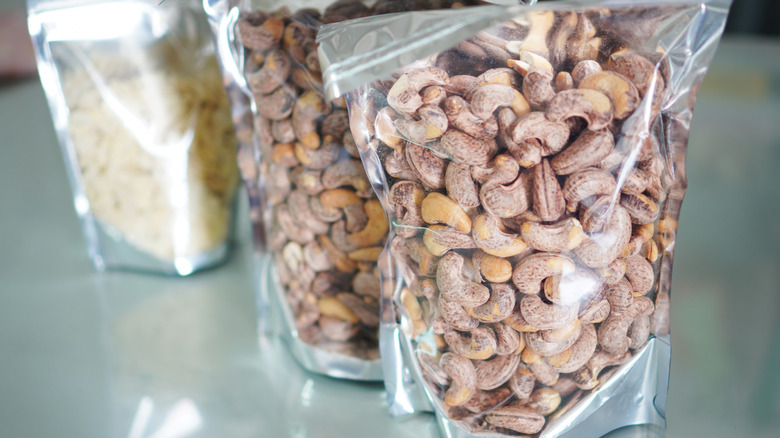The Tell-Tale Signs Your Nuts Have Gone Rancid
Stashed at the back of your cupboard you'll likely find bags of nuts you stocked up on — and may not have stored properly. Now you need some for that cookie recipe, or just for a nutritious snack. But how can you tell if your nuts have gone bad? Simple — smell them, because they usually develop an unsavory rancid odor.
There are other ways to detect your nuts have gone rancid. For example, fresh walnuts are light in color. When they've gone bad, they turn dark and might show evidence of mold — a sure sign to relegate them to the trash bin. If they've gotten to this point, they will have also gone soft and smell rancid, like paint thinner. Spoiled peanuts look dry and shriveled and will have a sour and musty odor.
Most nuts can turn soft and rubbery before they completely spoil. One way to check for freshness is to press down on a few to see if they have any give. If they crumble and break apart, you're good to go. If the nuts feel at all soft, they may be stale but still ok to use — just be sure they aren't rancid.
Proper storage is key
Though packaged nuts don't have an expiration date, their packaging should include a "best by" date indicating when they will be freshest. Nuts are sensitive to heat, light, and oxygen because their unstable fatty acids begin to break down the moment they're exposed to any of those elements. Thus, the way they're stored affects how long they'll last before going rancid.
So, the improper cache of your cashews can result in their growing moldy, drying out, or shriveling up in about a month. They may also develop an unpleasant bitter or sour taste and smell. Spoiled cashews, like most nuts, will also have a disappointingly soft texture. And though eating stale or rancid nuts isn't a health risk, it just plain isn't an enjoyable experience.
You can store nuts in your cupboard or pantry, but most experts agree that the best storage methods for keeping nuts fresh is to store them in airtight containers in the refrigerator. Or, better yet, the freezer. The shelf life of nuts differs as widely as their varieties. The shelf life for shelled walnuts, for example, is significantly prolonged — from two to four weeks in a room-temperature pantry, to nine to 12 months in the fridge, and up to two years in the freezer. If a pantry or cupboard is your only option, a cool, dark spot is best.
More tips for keeping nuts fresh
Regardless of where you plan to store them, packing nuts tightly into the container leaves less air to circulate thus reducing oxidation and premature spoilage. Due to their high-fat and low-moisture content, nuts freeze marvelously with little to no consequence to their taste or that oh-so-satisfying crunch. There's no preparation required when plopping those nuts in the deep freeze or fridge other than placing them in a well-sealed freezer bag or other airtight container. You can even toast or roast nuts before freezing them.
Whole nuts will last longer than chopped nuts. That's true also for unsalted nuts and those that still bear their protective shells. Cashews and almonds will last longest while pecans, peanuts, and walnuts are more apt to spoil sooner.
And unlike rancid nuts, stale nuts — though they've lost their snappy texture — can be revived to yummy crunchiness with a little roasting in a dry pan or oven. If you plan on roasting nuts, stale or fresh, be sure not to make one of the biggest mistakes when roasting nuts like putting them in a too-hot oven. Unroasted stale nuts will also work fine in certain applications like pie crusts, dips, thickening sauces, and other delicious and creative ways to use nuts. They can also be roasted with spices or herbs for a satisfying snack like these cinnamon spiced nuts.


